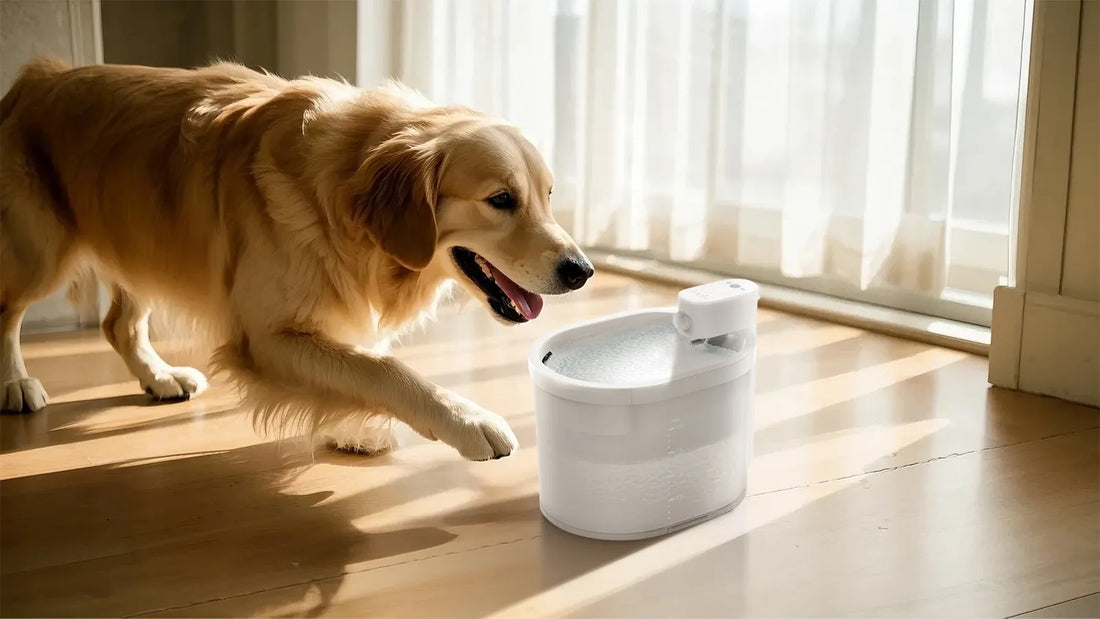Have you ever noticed your dog drinking water like there's no tomorrow? While it might seem harmless at first, excessive water consumption in dogs can be a sign of underlying health issues or behavioral changes. Understanding why your dog is drinking so much water is crucial for their well-being. In this article, we'll explore the potential causes, how to identify them, and what steps you can take to ensure your furry friend stays healthy and hydrated.
Normal Water Intake for Dogs
Before jumping to conclusions, it's essential to know what constitutes normal water intake for dogs. On average, a healthy dog should drink about one ounce of water per pound of body weight each day. For example, a 30-pound dog would typically consume around 30 ounces of water daily. However, factors like age, activity level, diet, and weather can influence this amount. If your dog is drinking significantly more than this, it's time to investigate further.
Common Causes of Excessive Water Consumption
1. Dehydration
Dehydration is one of the most straightforward reasons why a dog might drink more water than usual. This can occur after intense physical activity, exposure to hot weather, or if your dog hasn't had access to water for an extended period. Signs of dehydration include dry gums, lethargy, and loss of skin elasticity. Ensuring your dog has constant access to fresh water can help prevent dehydration.
2. Diet
Your dog's diet plays a significant role in their water intake. Dry kibble, for instance, contains less moisture than wet food, which might prompt your dog to drink more water. Additionally, a diet high in salt can increase thirst. If you've recently changed your dog's food or noticed an increase in their water consumption, consider evaluating their diet and making necessary adjustments.
3. Medical Conditions
Excessive water consumption can be a symptom of various medical conditions. Some of the most common include:
- Diabetes Mellitus: Dogs with diabetes often drink more water as their bodies try to flush out excess glucose through urine.
- Kidney Disease: Impaired kidney function can lead to increased thirst as the kidneys struggle to concentrate urine.
- Cushing's Disease: This condition, caused by an overproduction of cortisol, can result in excessive drinking and urination.
- Urinary Tract Infections (UTIs): UTIs can cause increased thirst as the body attempts to flush out bacteria.
If you suspect any of these conditions, it's crucial to consult your veterinarian for a proper diagnosis and treatment plan.
4. Medications
Certain medications can also lead to increased thirst in dogs. Steroids, diuretics, and anticonvulsants are known to have this side effect. If your dog has recently started a new medication and you've noticed a change in their water consumption, discuss this with your vet. They may adjust the dosage or recommend an alternative treatment.
5. Behavioral Factors
Sometimes, excessive water drinking is more about behavior than health. Boredom, anxiety, or even a habit formed from previous experiences can lead to increased water intake. For example, a dog that was once deprived of water might develop a habit of drinking excessively when water is available. Addressing the underlying behavioral issue through training, mental stimulation, or environmental changes can help curb this behavior.
How to Monitor Your Dog's Water Intake
Keeping track of how much water your dog drinks can provide valuable insights into their health. Here are some tips for monitoring their water intake:
- Measure Water: Use a measuring cup to pour a specific amount of water into your dog's bowl and note how much is left at the end of the day.
- Observe Behavior: Pay attention to how often your dog visits the water bowl and how much they drink each time.
- Track Changes: Keep a log of your dog's water consumption over time to identify any significant changes.
If you notice a sudden or drastic increase in water intake, it's essential to seek veterinary advice promptly.
When to See a Veterinarian
While occasional increases in water consumption might not be cause for concern, persistent or excessive drinking warrants a visit to the vet. Early detection of underlying health issues can make a significant difference in your dog's prognosis. Be prepared to provide your vet with details about your dog's water intake, diet, behavior, and any other symptoms you've observed.
Preventing Excessive Water Consumption
Preventing excessive water drinking involves addressing the root cause. Here are some general tips:
- Provide a Balanced Diet: Ensure your dog's diet is nutritionally balanced and appropriate for their age, size, and activity level.
- Regular Vet Check-ups: Routine veterinary visits can help catch potential health issues early.
- Mental Stimulation: Keep your dog mentally engaged with toys, puzzles, and training to prevent boredom-related behaviors.
- Access to Fresh Water: Always provide your dog with access to clean, fresh water, but monitor their intake to ensure it's within a healthy range.
By taking these steps, you can help ensure your dog stays hydrated without overdoing it.
Understanding why your dog is drinking so much water is the first step toward addressing the issue. Whether it's due to dehydration, diet, medical conditions, medications, or behavioral factors, identifying the cause allows you to take appropriate action. Monitoring your dog's water intake and seeking veterinary advice when necessary can help keep your furry friend healthy and happy. Remember, a well-hydrated dog is a happy dog, but excessive drinking could be a sign that something's amiss. Stay vigilant, and your dog will thank you for it.

![[🎃Halloween Sale]UAHPET Stainless Steel Self-Cleaning Cat Litter Box](http://www.uahpet.com/cdn/shop/files/1-cat-litter-box.jpg?v=1761890851&width=1600)












